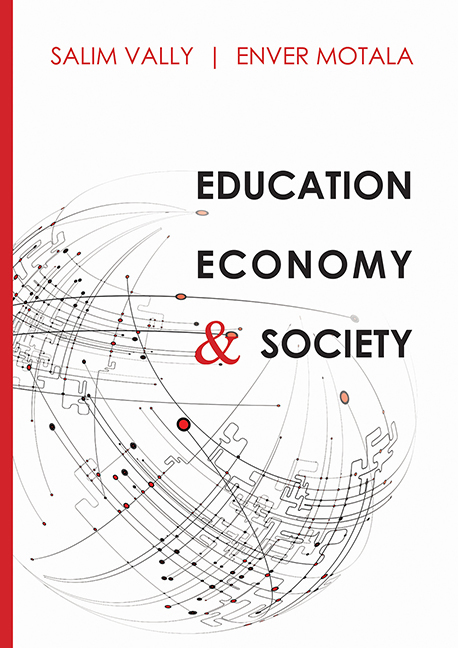Book contents
- Frontmatter
- Contents
- Foreword
- Preface
- About the contributors
- Acknowledgements
- Abbreviations and acronyms
- Chapter 1 ‘NO ONE TO BLAME BUT THEMSELVES’: Rethinking the Relationship between Education, Skills and Employment
- Chapter 2 EDUCATION AND ECONOMY: Demystifying the Skills Discourse
- Chapter 3 UNIVERSITIES AND THE ‘KNOWLEDGE ECONOMY’
- Chapter 4 GOING AROUND IN CIRCLES: Employability, Responsiveness, and the Reform of the College Sector
- Chapter 5 BUILDING A TRANSFORMATIVE PEDAGOGY in Vocational Education
- Chapter 6 SKILLS? WHAT SKILLS? JOBS? WHAT JOBS? An Overview of Research into Education/Labour Market Relationships
- Chapter 7 DEBATING THE NEXUS of Education, Skills and Technology in the Age of Lean Production: A Case Study of the ArcelorMittal Vanderbijlpark Plant
- Chapter 8 SKILLS, JOBS AND DECEPTION: Examples from the South African Workplace
- Chapter 9 ON THE USE AND ABUSE OF EDUCATION: Reflections on Unemployment, the ‘Skills Gap’ and ‘Zombie Economics’
- Chapter 10 THE YOUTH WAGE SUBSIDY in South Africa: Employment, Skills and ‘Churning’
- Chapter 11 EPISTEMIC INJUSTICE and the Struggle for Recognition: Human Dignity and the Recognition of Prior Learning
- Chapter 12 (RE)CLAIMING WORKERS' EDUCATION
- Chapter 13 SKILLS DEVELOPMENT in Post-Apartheid South Africa: Issues, Arguments and Contestations
- Index
Chapter 2 - EDUCATION AND ECONOMY: Demystifying the Skills Discourse
Published online by Cambridge University Press: 16 February 2020
- Frontmatter
- Contents
- Foreword
- Preface
- About the contributors
- Acknowledgements
- Abbreviations and acronyms
- Chapter 1 ‘NO ONE TO BLAME BUT THEMSELVES’: Rethinking the Relationship between Education, Skills and Employment
- Chapter 2 EDUCATION AND ECONOMY: Demystifying the Skills Discourse
- Chapter 3 UNIVERSITIES AND THE ‘KNOWLEDGE ECONOMY’
- Chapter 4 GOING AROUND IN CIRCLES: Employability, Responsiveness, and the Reform of the College Sector
- Chapter 5 BUILDING A TRANSFORMATIVE PEDAGOGY in Vocational Education
- Chapter 6 SKILLS? WHAT SKILLS? JOBS? WHAT JOBS? An Overview of Research into Education/Labour Market Relationships
- Chapter 7 DEBATING THE NEXUS of Education, Skills and Technology in the Age of Lean Production: A Case Study of the ArcelorMittal Vanderbijlpark Plant
- Chapter 8 SKILLS, JOBS AND DECEPTION: Examples from the South African Workplace
- Chapter 9 ON THE USE AND ABUSE OF EDUCATION: Reflections on Unemployment, the ‘Skills Gap’ and ‘Zombie Economics’
- Chapter 10 THE YOUTH WAGE SUBSIDY in South Africa: Employment, Skills and ‘Churning’
- Chapter 11 EPISTEMIC INJUSTICE and the Struggle for Recognition: Human Dignity and the Recognition of Prior Learning
- Chapter 12 (RE)CLAIMING WORKERS' EDUCATION
- Chapter 13 SKILLS DEVELOPMENT in Post-Apartheid South Africa: Issues, Arguments and Contestations
- Index
Summary
Introduction
The relationship between education and the economy is the subject of considerable media discussion, policy deliberation, academic writing and public angst. Yet there appears to be little understanding about the long and contentious history of the claims about the relationship between education and the economy, or more specifically, of education and economic growth.
In reality there are many factors which come into play in any attempt to resolve the complex and multifaceted challenges facing societies and their economic systems. Especially in relation to the potential ‘employability’ of those who are willing to enter the labour market, factors relating to the muted demand for skills uptake continue to act as a barrier to their participation. This is especially so in societies evincing egregious social and economic inequality and unequal relations of power.
For example, the recent crisis affecting the employment of workers in the clothing and textile industry in South Africa bears grim testimony to the exogenous nature of the conditions impacting on employment, in an industry where even workers who have developed high levels of skills built over many years of employment and training, remain highly vulnerable. For workers in South Africa's bedrock extractive industry, changes in the relative exchange rates, and indeed as the consequences of mineworker resistance to low wage regimes (as in the recent conflicts at a number of mines including at Lonmin's Marikana mine), often mean the difference between employment and unemployment, regardless of the levels of experience, training and skills they possess. Whole towns and villages disappear as producers of particular commodities or mining activities ‘disinvest’ once extractable ores are depleted or production plants are moved as a consequence of ‘labour unrest’ or because of environmental factors. Entire cohorts of technologically trained ‘human capital’ lose their relevance to the labour market once new substitutive technologies are introduced and skill training simply cannot resolve the resultant unemployment. The implication of this is that unless the underlying structural conditions which produce social and political exclusion are re-examined critically, long-term unemployment is the only likely consequence for those affected by these changes in the external environment as a consequence of changes in the labour process, technological ‘innovation’, worker resistance or investment boycotts engendered by calculations of profitability alone.
- Type
- Chapter
- Information
- Education, Economy & Society , pp. 26 - 47Publisher: University of South AfricaPrint publication year: 2014



